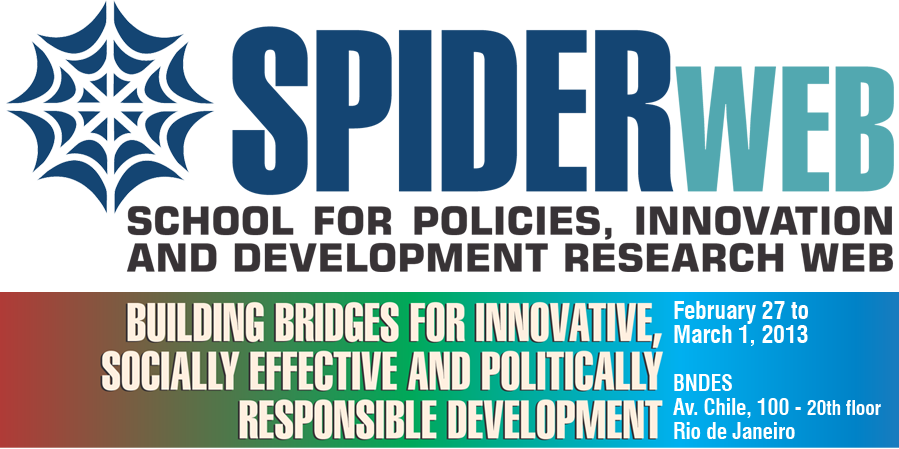Introduction
Good morning, welcome everybody. I'm going to keep my remarks brief and very informal
I´m going to start with a photo. This photo was taken at the 1997 International Seminar on Globalization and State Reform, a Comparative Perspective, organized by Leonardo Burlamaqui and myself. You can see in the photo a couple (Antonio and Ana Castro) seemingly amazed by what they see in front of them and, at their side, Benjamin Coriat, very suspicious of it all.
What was going on in front of them might have been the intellectual contest between Robert Wade and Bresser Pereira on State Reform, or Jan Kregel´s or Giovanni Dosi´s presentations during the Conference. Many other friends were also there: Fred Block, Geoffrey Hodgson, Erik Reinert, Wolfgang Dreschler, all of them members of The Other Canon movement. What followed the 1997 Conference was a series of different courses with brilliant scholars, Brazilian and foreign, coming to Brazil to lecture for a week or two to graduate students and policy makers (from BNDES, FINEP, Petrobrás, Banco do Brasil, and so forth). At that moment in time, their contributions changed minds and hearts, having great intellectual and policy repercussions. So, what we are starting today is not so new.
I kept thinking about or playing with the idea of what we are renewing and what´s really new in this Spider Web Project we are embarking upon.
We are certainly renewing the network of scholars, keeping in mind our broad theoretical and conceptual frameworks.I´ll call them our roots - Post-Keynesianism, Marxism and post-Marxism, evolutionary Schumpeterian approach, Institutionalism and its approaches, Polanyian vision, to quote the more frequent influences and schools that crop up among us. But we are enlarging and extending the group of members (and maybe approaches) of our diversified, and very peculiar, epistemic community.
We certainly are renewing themes and issues. Some are our old – but always evolving - material that was undoubtedly renewed by the economic crisis: globalization and its consequences for developing countries, international global governance institutions and their power structure, varieties of capitalism and state capacity (this is a renewed vision of the VOCs approach), development and sustainability, innovation as a central dimension, and knowledge governance (to introduce a new concept). Some issues are new, or now have a greater importance. China is the biggest example and the moment is opportune to consider how emerging economies such as Brazil should structure its long-term growth prospects. The question is how to reconceive Brazil’s international insertion, as well as its inter-regional, bilateral and multilateral relations. It seems urgent to evaluate development strategies and political options in an international economic and political order that combines multipolarity and increased competition.This seems new.
It might be necessary to take into consideration the degrees of freedom (and the degrees of constraint) countries have to face in the international arena. As Jan Kregel pointed out at the end of his introduction “thecurrent approach to global financial stability is in direct contradiction with the needs of developing countries (…) and (it will imply) the recognition that development will always involve international imbalances”.
We also see a new institutional framework for the School. At that time and up until 2004, we had both the old Graduate Program (at UFRRJ) and the Lato Sensu School (Institute of Economics), with support coming from BNDES and FINEP. Today this initiative arises from the Graduate Program of Public Policies, Strategies and Development (Institute of Economics, Federal University of Rio de Janeiro), which did not exist at the time, a young Graduate Program that started in 2008, and from the National Institute for Science and Technology for Public Policies, Strategies and Development, started in 2009.The SPIDER WEB, although embedded in PPED and INCT-PPED, aims to be a network of national and international Graduate Schools while also functioning as a School for Advanced Studies, a post-doc Program mainly sponsored by CAPES (responsible for the evaluation of Graduate Programs in Brazil) and CNPq (our National Research Council). For this workshop we also had the support of the Latin American Investment Bank (CAF), BNDES and Ford Foundation, and I thank all institutions for this sponsorship.
In sum, we have new members, new issues, and a new institutional framework. But what is really new in the Spider Web initiative? My answer would be our needs have changed.
It seems to me that we need a vision, an integrated vision coming from what I have called our conceptual roots. We need to engage in theoretical studies at the forefront, as well as empirical research with a comparative perspective to enable us to advance knowledge for new, strong, relevant, development strategies and implementation of effective public policies.
Finally, we would like to find the “pulo do gato” (in a literal translation that has no meaning in English the cat´s jump or a special ingredient for our emerging, middle income, developing countries, like Brazil, China, India, South Africa, Mozambique, Argentina, Mexico, Uruguay, and so many others.Antonio would love to be here for helping us in this task. Here's to us.
Ana Célia Castro
PPED Coordinator
Spider Web Coordinator







